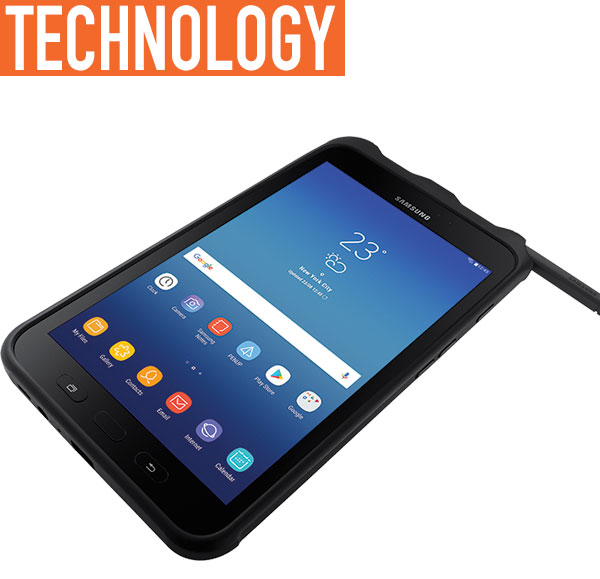Digitization is taking hold in every industry as more companies transition from paper-driven processes toward digital solutions. Fleet management is no exception. With more than 3.5 million truck drivers logging more miles than ever before, mobile devices are helping fleet management businesses boost efficiency and productivity, as well as increase overall employee satisfaction.
Since the Electronic Logging Devices (ELD) Mandate went into effect in late 2017, digitization is now a mandatory objective for fleet management enterprises. But while that shift may seem daunting, digital best practices are actually a win-win that benefit managers and operators alike. Mobile devices, such as tablets integrated with the right software, can help businesses manage driver safety and performance, recruit skilled employees, and give employees a better workplace experience.
REAP THE BENEFITS
When digitization enters a business, operators immediately feel the beneficial effects. Less time is spent filling out paperwork, and they can use a mobile device to electronically complete pre-driver inspection reports. When a driver steps in to operate a truck, they can quickly learn about its past driving history and be notified of issues to watch out for while they’re on the road. If problems do arise—from low air pressure in a tire to something more complicated—they can bring up information to diagnose and troubleshoot the problem more efficiently. On the business side, fleet operators can create a centralized process to manage maintenance, repairs, and operations (MRO).
With digital practices accelerating, fleet management organizations have an opportunity to transform their business. Here are some strategic guideposts to help fleet enterprises harness the power of this technology and advance their goals:
Go Rugged:
More mobile devices are offered in ruggedized form factors, meaning they can withstand inclement weather and harsh conditions where drivers often find themselves—whether on a loading dock in the rain, visiting a stockroom, or walking in and out of their truck. No matter the environment, certain ruggedized tablets can bring military-grade protection for withstanding drops, shocks, extreme temperatures, and water, all while performing vehicle diagnostic reports, tracking driving hours for ELD guidelines, optimizing fuel efficiency, and implementing safeguards that prevent distracted driving. Increasingly, when transportation companies bring in tablets, a rugged choice is the way to go.
Improve Worker Satisfaction and Safety:
Mobile devices make it easier for vehicle operators to handle day-to-day tasks, communicate with managers, and maintain personal satisfaction. For example, fleet managers can let their vehicle operators who spend long hours on the road use mobile devices as personal devices when they’re off the clock. This removes the need for drivers to purchase an extra device on their own and enables them to video chat with their families or watch a movie. Additionally, fleet managers can consider deploying smartwatches, helping vehicle drivers stay better connected and lead healthier lifestyles. For instance, fleet companies can incorporate fitness apps into drivers’ smartwatches, helping truck operators stay healthy by receiving exercise tips and reminders via smartwatch—important for workers spending much of their time seated. Smartwatch solutions can also increase driver safety, letting them use the device’s home button to instantly reach contacts in emergency situations. All of this helps fleet managers improve recruitment efforts and retain talented drivers and employees.
Leverage Data:
With mobile device solutions, managers have access to new information about metrics like fuel efficiency, travel time, and vehicle maintenance windows. They can see status updates on fleet deliveries in real time and can use digital driver profiles to gain better insights into each of their drivers in the field. Moreover, drivers can track road conditions along each route and quickly communicate with other drivers about potential changes while easily coordinating with maintenance crews if repairs are needed. With more data at one’s fingertips, and easily accessible through the cloud, transport companies can bring a new dimension of insight and efficiency to their fleets.
IT Friendly:
Fleet enterprise IT managers—responsible for deploying and updating mobile devices to a widely-distributed workforce—need to ensure they are getting the most advanced digital security tools to ensure their mobile devices are always up-to-date. In a world where security breaches are increasingly common, cutting-edge security software that is easily and quickly deployed is a necessary part of detecting vulnerabilities and protecting a fleet’s sensitive enterprise data. At the same time, managers can use these digital solutions to set up a schedule to push automated software updates that keep enterprise applications running smoothly without any interference to their operations.
As a mandatory objective, ELD compliance may have been a catalyst for fleet management enterprises to accelerate their path toward digitization. Now, more companies in the industry are embracing and experiencing digital practices and the benefits that come with them, such as lowering operating costs and increasing vehicle performance. Meanwhile, drivers see greater productivity and job satisfaction, thanks to better streamlining and communication. Mobile technology solutions are changing how the job gets done—making transportation more efficient, more engaging, and more productive for both operators and managers.
ABOUT THE AUTHOR:
Nicholas Kim is the lead for transportation vertical of the B2B division at Samsung Electronics America. Find out more, visit www.samsung.com.
MODERN WORKTRUCK SOLUTIONS: JULY 2018 ISSUE
Did you enjoy this article?
Subscribe to the FREE Digital Edition of Modern WorkTruck Solutions magazine.
![]()




